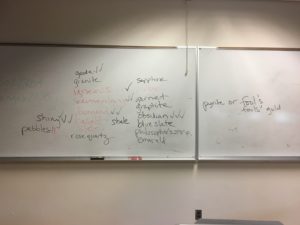In Spring 2020, I taught “Expulsion and the Housing Crisis,” a SUNY Geneseo literature course contemplating narratives flowing into and out of the 2008 global financial crisis.
Students read William Shakespeare’s King Lear, Michael Lewis’s The Big Short, Angela Flournoy’s The Turner House, Toni Morrison’s A Mercy, and Calvin Baker’s Dominion. They watched The Old Man and the Storm, Inside Job, Mr. Blandings Builds His Dream House, and they experienced a guest lecture by Pulitzer Prize winner David Cay Johnston, who spoke about money laundering.
As we interpreted literature, we engaged key course concepts: credit, bonds, fraud, moral hazard, trust, accountability, performance, effigy, and liquidity. We engaged practical matters from checkbooks to toxins to credit scores.
The course’s final assignment asked students to consider Octavia Butler’s Parable of the Sower alongside episodes of L.A. Podcast they’d been listening to all semester.
When COVID-19 scattered us into the digital world, the students persevered in that project, helping each other to build the essays that follow below.
——————————
Although I don’t live in L.A., L.A. Podcast allows me to bring the expulsion in Parable of the Sower closer to home and both past, current, and future circumstances have felt more personal due to these connections. Expulsion is more than the loss of a shelter, but the devastating loss of lives and livelihood mirrors the environment they fall under. An underlying realization that runs through both texts is that there is an experience of new normalcy accompanied by trauma that surrounds the old normal and a solution involving empathy is in our control yet seemingly unreachable.
A correlation that hadn’t occurred to me right away between both the texts, the housing crisis, and the current events are the effects on racial minorities. There is already a race discrepancy between socio-economic classes, and this leads to a discrepancy in the effects of expulsion as well. In the “I Wanna Lord Your Land,” the hosts talked about this correlation resulting in a higher housing loss and deaths. We saw this in the housing crisis of 2008 and are expecting to see it during the current epidemic. Although there’s a temporary hold on evictions, it’s not going to go away, and once the pause is over then there will be a spike in evictions and the supports, as unstable and few as there are, may crumble completely. However, regulations on policies during and after this time of uncertainty are difficult to judge, and even despite the devastation of the housing crisis, there was an act of returning to normal. While hearing the candidate’s campaign speeches in Parable of the Sower, Lauren raises a question that many people wonder today: “…worker protection laws for those employers willing to take on homeless employees and provide them with training and adequate room and board. What’s adequate, I wonder” (27). I find myself also wanting to push for security for those who need housing and those who provide it, but also wondering how any policies would be regulated or enforced to ensure that it would be successful in the long run. Unfortunately pauses on evictions are temporary and the money offered by the government isn’t enough to be self-sufficient. This was discussed in the “I Wanna Lord Your Land” episode as well. Landlords feel left out of government support and when things go back to “normal,” we may see even more housing failures. There was an obscene amount of evictions during the housing crisis yet support ended soon after and things were pushed to return to normalcy as soon as possible. I hope that during these times of uncertainty, however, there will be sufficient support for those who need support not only now but going forward when the situation starts to improve.
During the episode “Hotel It on the Mountain,” the hosts of the L.A. Podcast discussed how this new way of living which was so foreign a few months ago has become the new normal. Actions such as social distancing and wearing masks in public when leaving the house have become a habit and there is an almost trauma and sense of terror concerning the old normal of going without either of those things. The readers catch glimpses of the old normal through Lauren’s parents in Parable of the Sower and although this natural disaster is relatively recent, Lauren cannot imagine anything except her current reality. In the episode “SoCal Distancing” the hosts brought up a both/and about fear being used as a tool of manipulation. At first listen, I had an initial opposition to fear being used against people, yet I began to think of the positive outcomes. On one hand, I don’t condone fear mongering, but on the other hand, I wonder what would happen if this fear was used as a tool to save lives. Do the intentions behind the actions overrule the action itself? When people’s lives are at stake or the necessities in which they need to survive are threatened, where is the line in enforcing safety? In Parable of the Sower, conditions have become so dire that trust becomes a double-edged sword, and violence against others is normal just to ensure the survival of oneself. However, even a weapon to defend oneself is a luxury many cannot afford, and in terms of the housing crisis, thousands of people were left without any support to survive, some more than others.
Continue reading “Sower What About L.A. Podcast?”
